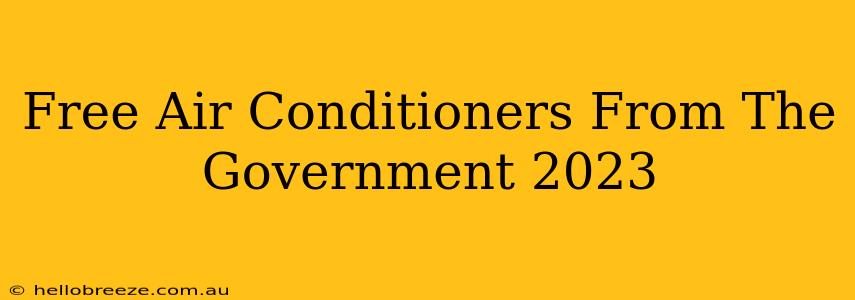The soaring summer temperatures have many people searching for ways to beat the heat, and a common question arises: Are there free air conditioners from the government in 2023? The short answer is complex; it depends on your location, income, and specific circumstances. While there isn't a single nationwide program offering free AC units, several government initiatives and utility programs may provide assistance to help you stay cool during the summer months. This guide will explore those options and offer valuable tips for finding relief from the heat.
Understanding Government Assistance Programs for Air Conditioners
Several avenues might lead to assistance with acquiring or installing air conditioning, but it's crucial to understand that these are usually not direct giveaways of free units. Instead, think of them as programs that can help reduce the financial burden. These programs often fall under broader energy assistance programs or are offered through specific utility companies.
1. Low-Income Home Energy Assistance Program (LIHEAP)
The LIHEAP is a federally funded program administered through state and local agencies. While it doesn't directly provide free air conditioners, it can offer financial assistance to help low-income households pay their energy bills, including the cost of running air conditioning. This financial help can be a significant step towards affordability. Eligibility requirements vary by state, so it's essential to check with your local LIHEAP agency to determine if you qualify.
2. State and Local Energy Assistance Programs
Beyond LIHEAP, many states and local governments offer their own energy assistance programs. These programs often have specific criteria and may focus on assisting vulnerable populations, such as seniors or people with disabilities. Searching online for "[your state/city] energy assistance program" will yield relevant results.
3. Utility Company Assistance Programs
Many utility companies offer their own programs to assist customers facing financial hardship. These programs may include bill payment assistance, energy efficiency upgrades (which can indirectly reduce cooling costs), and, in some cases, financial help towards purchasing energy-efficient air conditioning systems. Contact your utility provider directly to learn about specific offerings in your area.
4. Weatherization Assistance Programs
These programs aim to improve the energy efficiency of homes, often through weatherization upgrades that reduce the need for excessive cooling. By improving insulation and sealing air leaks, weatherization can significantly lower your cooling costs. This assistance is not directly for AC units but can effectively reduce the strain on your energy budget during summer.
Finding Help: A Step-by-Step Guide
- Determine your eligibility: Check your state's LIHEAP website and your local utility company's website for eligibility requirements.
- Gather necessary documents: This typically includes proof of income, residency, and identification.
- Apply for assistance: Complete the application process through the appropriate agency or utility company.
- Follow up: Contact the agency or company if you haven't heard back within a reasonable timeframe.
Beyond Government Assistance: Other Options
If government programs aren't suitable for your situation, consider other options for affordable cooling:
- Energy-efficient AC units: Investing in a unit with a high SEER (Seasonal Energy Efficiency Ratio) rating will reduce long-term energy costs.
- Fans: Fans offer a cost-effective way to supplement air conditioning or cool smaller spaces.
- Window coverings: Blocking sunlight can significantly reduce heat buildup in your home.
- Community resources: Check with local organizations like churches or community centers for potential cooling relief programs.
Remember: The availability of free air conditioners from the government is limited. Focusing on programs providing financial assistance or energy efficiency improvements is a more realistic approach to tackling summer cooling costs. Always verify information with official sources to avoid scams and misinformation. Staying informed and proactive is key to staying cool and comfortable during the hot summer months.

